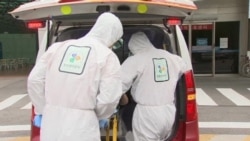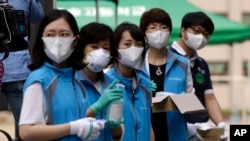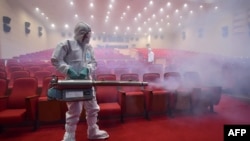South Korean health officials reported five new MERS cases Monday, bringing the total number of infected to 150 people, but said the rate of new infections is declining.
Authorities say if the country’s improved containment measures continue to be effective, the outbreak in South Korea could be over in 14 days, when the current incubation period ends.
Kwon Jun-Wook, who heads of the MERS taskforce in the Ministry of Health and Welfare, said they are monitoring the 12 hospitals where the MERS virus has been found and are not seeing any new infections from outside the groups already under quarantine.
“At this point, everything is under control and if an additional cluster does not occur, the final date will be June 27th,” Kwon said.
Origin of virus
MERS was first identified in Saudi Arabia in 2012. It is a respiratory illness that initially produces flu-like symptoms, but can escalate to pneumonia and kidney failure. There is no known cure or vaccine.
In South Korea, 16 people have died after being infected with the virus. But the Health Ministry says the fatality rate has remained at 10 percent, which is much lower than the 35 percent fatality rate that occurred in past outbreaks.
A joint mission of the World Health Organization and the Korean Health Ministry said the virus “does not appear to have changed to make itself more transmissible.”
Instead, other factors like overcrowding in emergency wards and hospital rooms, and the lack of controls in limiting family members' access to these areas may have played a large role in facilitating the spread of the virus.
Super spreader patients
Health officials also disclosed the country’s surge of infections was because of three “super spreader” patients. Before, only the country’s first patient, the 68-year-old man who was infected with the virus during a trip to the Middle East, was a so-called “super spreader.” He was responsible for infecting a large number of people when he visited four hospitals seeking treatment before he was properly diagnosed.
Kim Woo-joo, a professor of infectious diseases at Korea University, said patient one, patient 14 and patient 16 all had pneumonia and likely carried very high viral loads that enabled them to pass the virus on in crowded hospital settings. One of the “super spreaders” stayed in the emergency room of the Samsung Hospital in Seoul for three days before he was diagnosed. Together they were responsible for 88 percent of the 150 confirmed cases of MERS in Korea.
Professor Kim said hospitals have corrected these problems and are immediately isolating anyone who exhibits flu like symptoms or has been in contact with a MERS patient. Since the new policies, infections have declined.
“The focus at this point is to prevent the occurrence of a new ‘super spreader,” he said.
The South Korean government was initially criticized for being slow to respond to the public health threat and for not immediately disclosing the names of the hospitals where MERS cases were found. Since then it has taken strong measures to contain the spread of the deadly virus and conducted daily updates on the status of the outbreak
The Samsung Hospital in Seoul was virtually shut down Sunday, canceling most surgeries, closing the emergency room, not accepting new patients and restricting the access of relatives to the patients still under hospital care.
The Prime Minister’s office announced that it is sending in an inspection team to the Samsung Hospital to look into why the medical facility failed to control the spread of the virus and supervise and how to prevent further infections there.
President cancels US visit
President Park Geun-hye canceled a state visit to Washington to deal with the MERS outbreak at home. On Sunday she visited the Seoul National University Hospital where MERS patients are being hospitalized.
More than 5,000 people who might have been exposed to the deadly virus have been quarantined or ordered to stay at home.
The government is trying to reassure the public there is very low risk of infection in the community at large. The virus has been linked for most part to hospitals only.
Attendance at public events and retail sales are still down, but these domestic industries could quickly rebound once the public health threat is over.
But the South Korean tourism industry could take much longer to recover.
Kim Chulmin with the Ministry of the Culture, Sports and Tourism says tourism has declined more than 20 percent in the last month. He said it could take months to recover after the outbreak ends.
“So let's say we have a reduction of 20 percent of tourists from June, July and August, that would be 820,00 people, not coming to Korea and $900 million in lost revenue,” Kim said.
Meanwhile, South Korea's Education Ministry announced 2,464 schools reopened, while 440 schools remained closed. The World Health Organization had earlier recommended reopening the nearly 3,000 schools that had been closed because there is no evidence virus transmission is linked to these facilities.
VOA Seoul Producer Youmi Kim contributed to this report.








